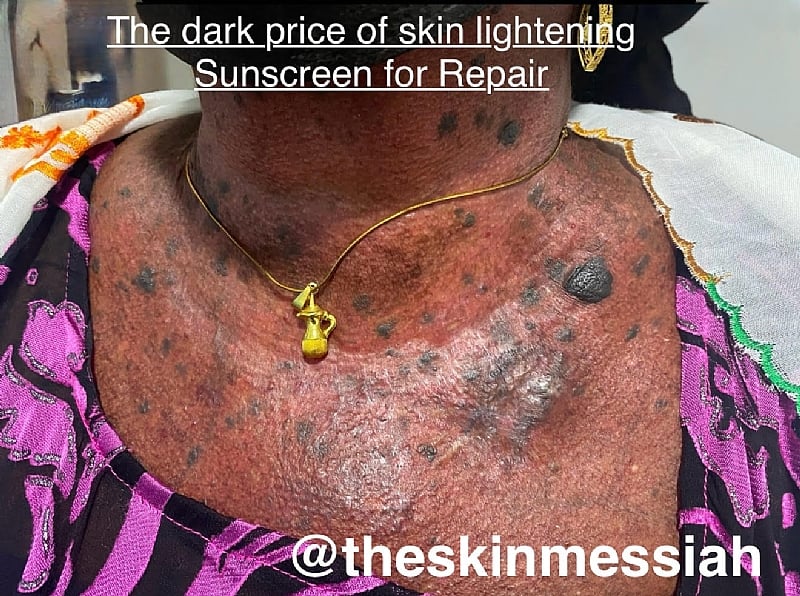The pursuit of beauty in Ghana has taken a dangerous turn, evolving into a public health crisis fueled by societal pressures, social media influence, and the readily available influx of harmful cosmetic products. Dr. Kofi Ansah Brifo, a resident dermatologist, has voiced his concerns about the alarming trend of skin bleaching and body modification practices among young Ghanaian women, highlighting the devastating physical and psychological consequences. This crisis is rooted in a distorted perception of beauty that equates light skin and curvaceous figures with higher social status, a perception further amplified by social media algorithms that favor influencers conforming to these ideals. Young women are caught in a psychosocial conflict, pressured by societal expectations while simultaneously bombarded with images of unattainable beauty standards online. This dual pressure leads to body dysmorphia, anxiety, and depression, pushing them towards risky procedures and products to alter their appearance.
Dr. Brifo argues that the current beauty standards in Ghana are a distorted reflection of historical perceptions. While traditionally, markers of affluence like plump cheeks and neck folds were considered beautiful, these ideals have morphed into an obsession with extreme thinness and light skin. Social media has exacerbated this trend, creating a culture where young women feel compelled to conform to these often unrealistic standards. The pursuit of these ideals has transformed from a personal choice to a perceived cultural obligation, driving women to engage in harmful practices such as skin bleaching and the use of unregulated pills and injections for body enhancement. These practices carry significant health risks, including skin thinning, metabolic disorders, and irreversible conditions like exogenous ochronosis. The situation demands immediate action to prevent further damage and promote a healthier understanding of beauty.
The unregulated influx of cosmetic products into the Ghanaian market has also contributed significantly to the crisis. Dr. Brifo cites the liberalization of the Ghanaian economy in the late ’80s and ’90s as a pivotal moment, opening the door to a flood of unregulated beauty products. Products like “Abidjan Crème” and the oral steroid Dexacortin became widely misused for skin lightening and body enhancement, despite their known harmful effects. The lack of strict regulations and import controls has allowed these dangerous products to proliferate, making them easily accessible to vulnerable young women. The absence of effective oversight by regulatory bodies has created a permissive environment where harmful products can thrive, further fueling this public health emergency.
Dr. Brifo proposes a multi-pronged approach to address this crisis. He calls for stricter cosmetic regulations and import controls to stem the flow of harmful products into the market. He urges the Food and Drugs Authority (FDA) to intensify efforts to stop the sale of unauthorized skin-lightening creams, advocating for a ban on harmful cosmetic products and a real-time surveillance system to target underground distribution networks. Furthermore, he emphasizes the need for a nationwide public awareness campaign targeting schools and social media users to educate them about the dangers of these practices and promote a healthier image of beauty. This campaign should highlight the long-term health consequences associated with skin bleaching and body modification, emphasizing the importance of self-acceptance and body positivity.
Beyond regulatory action and public awareness campaigns, Dr. Brifo underscores the critical need for cultural change. He calls for a redefinition of beauty that celebrates natural features and prioritizes health and well-being over artificial enhancements. He stresses the importance of teaching young girls that melanin is not a flaw but a mark of beauty and that true elegance lies in confidence, intelligence, and self-acceptance. Holding influencers accountable for the standards they promote is crucial, as they wield significant power over their followers. They must be encouraged to promote responsible beauty standards that prioritize health and self-love over potentially harmful practices. This cultural shift requires a collective effort from families, educators, media personalities, and influencers to challenge existing beauty norms and promote a more inclusive and healthy ideal.
Dr. Brifo draws a compelling parallel between Ghana’s obsession with appearance and its tendency to favor short-term solutions over sustainable practices. He argues that just as some governments might attempt to mask underlying infrastructure problems with superficial fixes, individuals are damaging their skin in pursuit of fleeting societal approval. This short-sighted approach has long-term negative consequences, both for individual health and for the overall well-being of society. He concludes with a powerful warning, urging Ghanaians to reject this misguided pursuit of beauty before it becomes a “dermatological dumsor” – a beautiful facade masking a deeply damaging reality. The analogy to “dumsor,” a term used to describe Ghana’s persistent power outages, emphasizes the potential for this beauty crisis to become a widespread and chronic problem if not addressed proactively and comprehensively. The focus must shift from superficial enhancements to promoting genuine self-acceptance and a holistic appreciation of beauty that encompasses health, confidence, and inner well-being.


